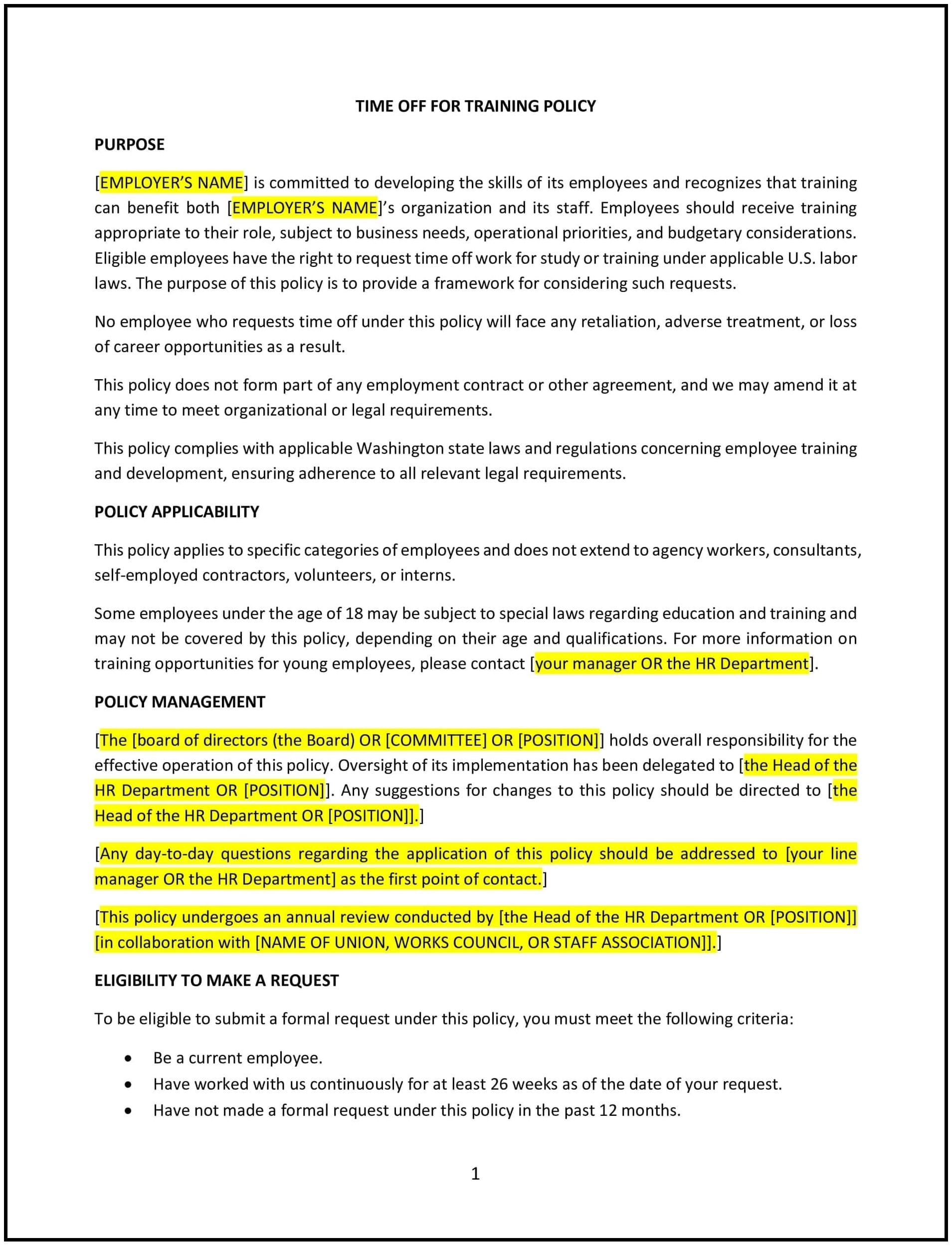Time off for training policy (Washington): Free template
Got contracts to review? While you're here for policies, let Cobrief make contract review effortless—start your free review now.

Customize this template for free
This time off for training policy is designed to help Washington businesses manage employee requests for time off to participate in job-related training, professional development programs, or educational opportunities. The policy outlines the conditions under which employees may request time off for training, the approval process, and the company's expectations for employees' participation in training programs that enhance their skills and knowledge.
By adopting this policy, businesses can foster employee growth, ensure that the workforce remains skilled and competitive, and comply with Washington state laws regarding time off for training.
How to use this time off for training policy (Washington)
- Define eligible training opportunities: The policy should specify which types of training are eligible for time off, including job-specific training, professional development, certifications, and educational programs. It should clarify whether training needs to be related to the employee’s current role or if broader development programs are eligible.
- Establish approval procedures: The policy should outline how employees should request time off for training, including the process for submitting requests, the timeline for approval, and who is responsible for granting the leave. It should ensure that employees follow a formal process to request time off for training.
- Specify the duration of time off: The policy should clearly state how much time off employees are entitled to for training, including any limitations on the number of training hours or days employees can take off per year. The policy should balance employees' training needs with the operational requirements of the business.
- Address compensation for time off: The policy should specify whether employees will be paid during time off for training, or if the time will be unpaid. In many cases, employees may be compensated for training hours, especially if it directly benefits their role.
- Promote job-related development: The policy should encourage employees to seek out training opportunities that will enhance their skills and directly contribute to their performance and growth within the company. It should emphasize the importance of continuous learning and development.
- Ensure compliance with Washington state laws: The policy should ensure compliance with Washington state laws regarding employee rights and leave, including laws on paid and unpaid leave for training purposes. It should also align with federal regulations that govern employee training and development.
- Review and update regularly: Periodically review and update the policy to ensure it remains compliant with Washington state laws, federal regulations, and any changes in company operations. Regular updates will help ensure the policy stays relevant and effective.
Benefits of using this time off for training policy (Washington)
This policy offers several benefits for Washington businesses:
- Promotes employee development: By offering time off for training, businesses encourage employees to develop new skills, which can enhance their performance and productivity. It also supports career growth, leading to greater employee satisfaction and loyalty.
- Increases employee engagement: Employees are more likely to feel engaged and valued when they are given the opportunity to learn and develop professionally. This can lead to higher morale and motivation.
- Improves company performance: Well-trained employees contribute to improved company performance by bringing new knowledge, skills, and innovative ideas to the workplace. Offering training opportunities ensures the company remains competitive and up to date in a rapidly changing environment.
- Reduces turnover: Employees who feel that the company supports their professional development are more likely to stay with the organization. This policy can reduce turnover and improve employee retention by showing employees that their growth is valued.
- Promotes compliance with legal requirements: The policy helps businesses comply with Washington state laws regarding leave for professional development and ensures that employees' rights are protected when requesting time off for training.
- Supports a culture of learning: Implementing this policy reinforces the company’s commitment to fostering a culture of learning, which can enhance the organization’s reputation as an employer of choice and attract top talent.
Tips for using this time off for training policy (Washington)
- Communicate the policy clearly: Ensure all employees are aware of the time off for training policy and understand the steps for requesting training leave. Include the policy in the employee handbook, review it during onboarding, and provide periodic reminders.
- Encourage employees to take advantage of training opportunities: While the policy allows time off for training, it’s important to actively encourage employees to pursue professional development that will benefit their skills and performance.
- Monitor training usage: Keep track of how much time employees take off for training to ensure that the policy is being applied consistently and that training requests do not disrupt company operations.
- Provide support for training opportunities: Ensure employees have access to the resources and training programs they need to succeed. This may include offering financial support for training costs or helping employees find suitable programs.
- Address scheduling conflicts: If training requests conflict with critical business operations, work with the employee to reschedule or find a solution that minimizes disruptions. Be flexible when possible to ensure that employees are able to participate in valuable training programs.
- Review and update regularly: Periodically review the policy to ensure it remains compliant with Washington state laws, federal regulations, and any changes in the company’s operations. Regular updates will help keep the policy relevant and effective.